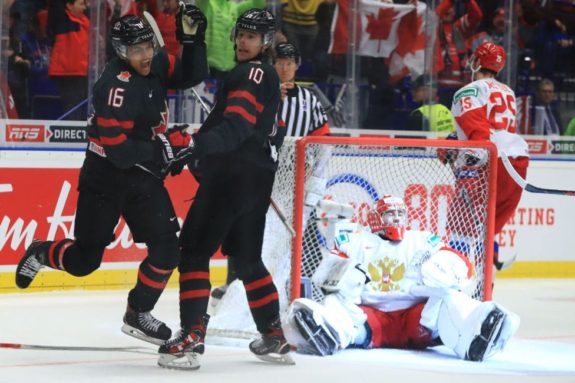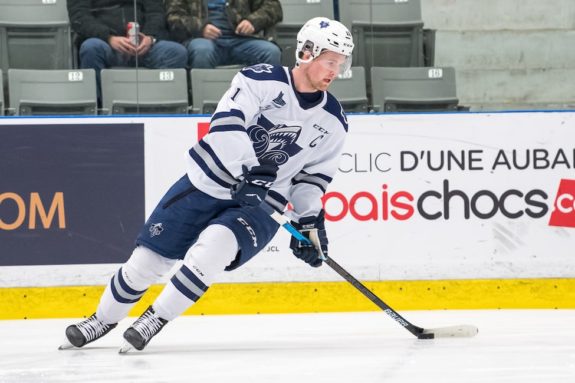There was no shortage of storylines throughout the tournament for Team Canada. From injuries to suspensions, it seemed as if they would have a lot to overcome. In the end, the biggest story was Canada earning their 18th gold medal after a tough, hard-working come from behind 4-3 victory against their biggest rival.
It wasn’t easy for Canada, but they got the job done. After a discouraging finish in Vancouver and Victoria last year, this team went in with a different mindset. From the selection camp, all the way through to their gold medal game, the focus was on winning gold. Anything other than that would have been unacceptable.
All in all, it was a collective group effort from the beginning that put them back on top of the hockey world.
Canada Flips the Script
After a disastrous second game against Russia, many didn’t know what to expect from Canada. Being in the tougher group, Canada didn’t waiver. Following the loss, a spark was ignited that rejuvenated the team to avoid a repeat of the previous year. Since the loss, Canada scored 17 goals and allowed four goals against before their re-match against Russia. Heading into the gold medal game, Canada had many reasons to prove that the blowout loss was a one off.
There’s a reason why Canada and Russia is the best rivalry in sports. You never know what to expect and you’re always in for an exciting game no matter what. And that’s what the viewers got. After 40 minutes Canada was down 2-1 heading into the third period, which is where things got extremely hectic.

When Maxim Sorkin made it 3-1, it seemed like Canada was down for the count with Russia being a dominant force in the offensive zone. Just under a minute later, London Knights’ forward Connor McMichael deflected a Calen Addison shot off his leg. After a review, it was ruled a good goal. And cue the comeback.
Captain Barrett Hayton followed that up with a snipe on the power play, after he was considered to be a “longshot” to play after suffering an injury in the semi-final game against Finland. Less than five minutes later, Niagara Icedogs’ forward Akil Thomas gave Canada the lead with an unbelievable effort in tight on Russian goaltender Amir Miftakhov, scoring his only goal of the tournament, which became the golden goal.
It’s fitting that Canada redeemed themselves after the round robin debacle. Not only that, they were able to flip the script with a comeback victory of their own. In 2011, Canada had a 3-0 lead and lost 5-3 to Russia. This time around they didn’t give up and continued to battle to the very end.
Overcoming Adversity
Many expect Team Canada to be a favourite each year at the tournament. After a disappointing finish last year the players, especially the returnees, wanted to put that year behind them and use that as motivation heading into this year’s tournament. Everything looked great for them after winning against the United States.
However, what would the World Juniors be without any adversity? Team Canada had to endure it and the list is quite extensive: a 6-0 thrashing at the hands of Russia, an injury to their star player in Alexis Lafreniere, a suspension to Joe Veleno, an early ejection to Nolan Foote against Slovakia and an injury to their captain Barrett Hayton. This is a lot for any team to deal with.

After the loss to Russia, Canada looked like a whole different team. They knew that the game wasn’t acceptable and they turned things around in order to be the team that many wanted them to be. No matter what came their way, they used it as motivation to overcome adversity. Their ability to adjust to any situation was a reason why Canada was able to be successful and win gold. For the returning players from last year’s team, overcoming all these obstacles makes winning the gold medal even more meaningful.
Alexis Lafreniere Impressed
After scoring once at the World Juniors last year, consensus 2020 first overall pick Alexis Lafreniere put on an offensive clinic. Even though he missed two full games and two periods against Russia with a left leg injury, Lafreniere was still a major offensive producer when he played. In five games played, Lafreniere had 10 points (two assists coming in the gold medal game) and would’ve been among the tournament leaders in points had he not suffered the injury.
But what we noticed from Lafreniere is what exactly makes him special. He has high-end puck moving skills along with a powerful release and accurate shot. His creativity with the puck, and his vision are what have cemented his position in the draft. What stood out the most was his ability to get into the corners and provide a physical presence. With his size and skill there’s no doubt that he will be able to hold his own in the NHL, when he gets the opportunity.

While he didn’t play as much as he wanted, Lafreniere showcased his talents when he was able to and he didn’t disappoint. He was called upon to be an impact player and he delivered, earning the most valuable player and best forward awards.
Joel Hofer: Canada’s Backbone in Net
Canada’s goaltending situation was really interesting. Olivier Rodrigue had the most international experience over Nico Daws and Joel Hofer. Daws was named the starter against the Americans and Russians in the round robin. Hofer came in to relieve Daws, and that had people asking, is there an issue in net?
Canada decided to go with Hofer for the next game against Germany. The coaches and Hofer didn’t look back from there. The Portland Winterhawks goalie had a 1.60 goals against average and .939 save percentage (SV%), allowing only six goals since coming in for Daws in the game against Russia. He provided the steady goaltending that Canada needed for them to turn their tournament around.
If Canada had any chance to get back in the tournament at all, their goaltending needed to be better and it was. Hofer was terrific in the gold medal game, making 38 saves and earning a .920 SV%. Hofer gave Canada a fighting chance to come back from being down 3-1. Even when things got ugly, Hofer was there to help them out. This is how you earn the best goalie award at the tournament.
Captain Canada Played Through Pain
Even though there was a possibility of him missing the final game, Barrett Hayton had other plans. He wasn’t going to let the shoulder injury he suffered in the semi-finals make him miss the gold-medal game against Russia.
Hayton played through the pain and it was noticeable. For the first two periods, he looked to be a little reserved in his play instead of being his usual aggressive self in the offensive zone. However, he started to get more comfortable as the game went one. It wasn’t until 8:39 when Captain Canada came through.
Being one of the returning players and leaders of this team, Hayton showed resiliency and strength. With the way his narrative played out in the last 24 hours, it will be remembered as one of the most iconic stories of Team Canada.
This game and tournament will go down in history as one of the best for the fans, the coaches, the staff and, most definitely, the players.